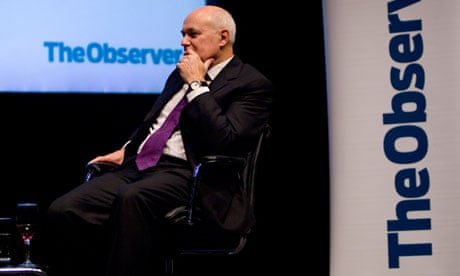If you want to combat poverty, empower women. There are few uncontested arguments in social policy, but this is one of them. Give women control of their fertility and overpopulation and undereducation will fall. Give women financial independence and they will have the means to free themselves and their children from dangerous men.
Everyone accepts the proposition that, in general, mothers are more likely than fathers to spend money on children. Even the British government accepts it after a fashion. But religious bigotry, rightwing prejudice and bureaucratic convenience have made the coalition determined to forget what it already knows.
The Conservatives and – for we should not forget the organ grinders' monkeys – the Liberal Democrats are prepared to stop paying child tax credits direct to mothers. They can keep child benefit but everything else must go. Iain Duncan Smith's universal credit packages child tax credit together with other benefits into a single means-tested lump. The government's opponents haven't protested too loudly yet about the effects on women's living standards because they have had so much else to worry about.
They can see that Duncan Smith has learned nothing. He is proposing to implement universal credit with the help of yet another gargantuan Whitehall IT project, even though history shows they invariably do not provide the promised efficiencies, when, that is, they work at all. The peculiar genius of Whitehall allows universal credit to cost the taxpayers more, while simultaneously leaving 400,000 of the countries' poorest families poorer. As the Chartered Institute of Housing puts it, households that earn £247 or less a week will see a fall in real income in 2015, and lone parents will be worse off, whatever their circumstances.
Misogyny may not therefore be the only reason why the plight of women has not received attention. Like a low hum in the background, it cannot be ignored, however. I suspect the hum will grow louder as the magnitude of what the coalition is attempting becomes clear.
The right has always accused leftists of wanting to be the "engineers of human souls" who seek to coerce the crooked timber of humanity into unnatural shapes. Conservatives flatter themselves into believing that they are not slaves to an ideology but commonsensical men and women who go with the grain of human nature, even if they do say so themselves.
If they were the realists they claimed to be, they would not stop at saying that a strong family is an incontestable blessing. They would accept that relationships break up because men can be domineering and worse, and resolve to do nothing to hinder women who are looking for a way out. But the right is just as ready to fantasise as the left and just as ready to believe it can sweep away the unworthy and morally incontinent British and replace them with a more respectable alternative.
The benefit changes have been designed to "reinforce the traditional male breadwinner model", in the words of the Women's Budget Group, an alliance of academics and trade unionists, which fights a determined, if often hopeless, battle to defend poor and working-class women. Reinforce the patriarchal male and, inevitably, you restrict women's independence.
The coalition's stated reason for "reforming welfare" is to make work pay. The universal credit will indeed increase the incentive for one member of a couple to move into employment. Incentives for many second earners will be less than they are now. The "second earner", as you can probably guess, is more likely to be a woman devoting more time to child rearing.
The best reason to dismiss the notion that Duncan Smith is a decent man who is genuinely concerned with relieving poverty is to look at who he is directing money to and why. At present, the state pays child tax credit to the child's "main carer", who is almost always the mother. From now on, a couple will "decide" whose bank account should receive the money. The worst type of man – not just abusive partner but the guy more likely to go to the pub than buy nappies – will have the power to insist that the money is directed to his account and that he scoops the pot.
Duncan Smith is tearing up settled policy. Save the Children and many other charities want him to allow mothers to receive a separate stream of income. On no account will he do it. If I wanted to be kind, I might say that directing payments into one account saves administrative costs. But there is no reason to be kind when, with the zeal of a Catholic convert, Duncan Smith made Philippa Stroud, the head of his pet thinktank, the Centre for Social Justice, and then his special adviser at the Department for Work and Pensions.
Ms Stroud is a member of the Newfrontiers church. Her husband is a leader of this evangelical outfit, which teaches that a man is a "servant leader" who directs the women and children beneath him. The husband has "authority" over the wife and she embraces "male servant leadership and joyful female submission".
Whether Duncan Smith was receiving the ideas of Ms Stroud, or the directions of her "servant leader" husband, is an open question. What is beyond dispute is that he moves in a world where hedge fund managers with a fundamentalist bent donate millions to the Tory party because they believe that Labour wants to "dismantle" families. Given his beliefs and the crowd he hangs out with, I cannot see sensible objections that his policies will make women overdependent on men will bother him in the slightest.
There is a notion from some "post-liberal" commentators, as well as in Tory journals, that atheists are as fanatical as religious fundamentalists. There's nothing to choose between them. They are equally prone to irrational ideas and equally dangerous.
Even as moral equivalence, the argument fails. It is not just that no one thinks when they hear that a bomb has exploded in Boston: "That's another young man Richard Dawkins has turned into a terrorist." Those who pretend they see no difference between atheism and religion devote all their time and energy to condemning the former while finding reasons to be elsewhere when religious militancy needs fighting. The apologist hides behind the mask of the even-handed commentator.
If I am wrong, let the welfare "reforms" be a test. Can they admit that the struggle for women's rights is everywhere and always included a struggle against religion? Or will they duck out again?

